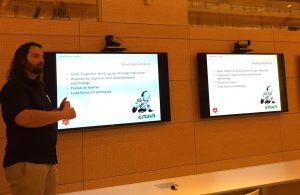
The 2016 AGI conference, which is part of The Joint Multi-Conference on Human-Level Artificial Intelligence 2016, successfully concluded last week in New York City.
This conference features several keynotes speeches by leading thinkers from different fields relating to human-level AI research, including work by IIIM’s director and staff.
Continuing the mission of past AGI conferences, AGI-16 gathers an international group of leading academics and industry researchers involved in scientific and engineering work aimed directly toward the goal of Artificial General Intelligence.
The original goal of the AI field was the construction of “thinking machines” – that is, computer systems with human-like general intelligence. Due to the difficulty of this task, for the last few decades the majority of AI researchers have focused on what has been called “narrow AI” – the production of AI systems displaying intelligence regarding specific, highly constrained tasks.
In recent years, however, an increasing number of researchers have recognized the necessity – and feasibility – of returning to the original goals of the field by tackling intelligence as a whole. There is a call to transition back to confronting the more difficult issues of “human-level intelligence” and more broadly artificial general intelligence. AGI research differs from the ordinary AI research by stressing on the versatility and wholeness of intelligence, and by carrying out the engineering practice according to an outline of a system comparable to the human mind in a certain sense.
For this year’s conference IIIM Director, Kristinn R. Thórisson co-organized and presented a workshop on Environments and evaluations for AGI with invited presenter Julian Togelius. Thórisson held three talks, one of which presented a new theory of understanding and meaning. See links below:
- Thórisson, Kremelberg, Steunebrink, Nivel. About Understanding (video)
- Thórisson, Bieger, Thorarensen, Sigurdardottir, Steunebrink. Why AI Needs a Task Theory – And What It Might Look Like (video)
- Steunebrink, Thórisson, Schmidhuber. Growing Recursive Self-Improvers (video)
CADIA’s Jordi Bieger also presented his Ph.D. research proposal “Artificial Pedagogy” at the doctoral consortium. The goal of his work is to study the science of how to teach an AI, with an emphasis on systems that aspire to reach or surpass human-level intelligence.
The AGI conference series has played, and will continue to play, a significant role in the resurgence of research on artificial intelligence in the deeper, original sense of the term. These conferences encourage interdisciplinary research based on different understandings of intelligence, and the exploration different approaches to creating more lifelike AI.
The AGI conferences are organized by the Artificial General Intelligence Society, in cooperation with the Association for the Advancement of Artificial Intelligence (AAAI). All the lectures can be watched online here.
